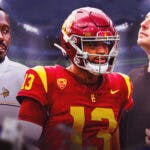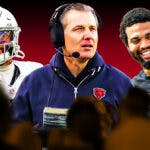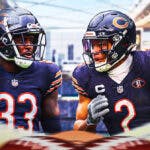The Chicago Bears have gone against the grain of today's pass-happy NFL, utilizing old-school defensive means to climb to the top of the NFC North.
When one thinks of the best NFL teams in 2018, they may think of the high-flying offenses boasted by teams like the Los Angeles Rams, New Orleans Saints, or Kansas City Chiefs.
They've long lost the age-old adage “defense wins championships.” Not in today's NFL, at least. No, the mantra of pro football today is to establish a dynamic and high-scoring offense, have a Pro Bowl-caliber quarterback and surround him with enough weapons so that opposing defenses have no choice but to take their licks.
Oh, and it helps this is the exact formula the league wants — high-scoring affairs with more than enough action to entertain the most casual of fans.
But then, there are the Chicago Bears.

At 8-3, the upstart Bears are doing the exact opposite of what is trending right now in football. Instead of bolstering the offense under offensive-minded head coach Matt Nagy, the Bears are riding their 2018 hot streak by way of their defense, conjuring thoughts of what the Denver Broncos did en route to victory in Super Bowl 50.
Think of this for a minute. Within a division boasting quarterbacks like the Detroit Lions' Matthew Stafford, the Minnesota Vikings' Kirk Cousins or the Green Bay Packers' Aaron Rodgers, Chicago is getting by with second-year pro, Mitchell Trubisky — arguably the least proven and potent of the bunch. Running back Jordan Howard, who was once the team's best offensive weapon not long ago, has been relegated to something of an afterthought this season.
Sure, the Bears may have the league's sixth-best scoring offense after 12 weeks. But their offensive drives are averaging just 31.0 yards, which ranks 21st.
Know why? Defense.

The simple explanation is this: Chicago has the third-best scoring defense and the third best in yards allowed. Fine. That tells us a lot. But so does the fact teams can't run the ball on the Bears effectively (they're tops here, allowing an average of 3.6 yards per attempt). And passing, even with all those rule changes and the like, is still tricky. Opponents are averaging just 5.7 yards against Chicago — fourth best in the league.
When you combine it all, the Bears may have the league's best defense in 2018. Football Outsiders thinks so, and their DVOA metric (explained here) puts Chicago at No. 1 among all teams, defensively.
OK, so how did the Bears come to this?
It's a long story. Too long for any one accounting. But it sure doesn't hurt to have defensive coordinator Vic Fangio calling plays. And those have turned in one of the better secondaries in the league — a unit leading the NFL with 20 interceptions on the season.
Chicago's defense is opportunistic. Cornerback Kyle Fuller is having an All-Pro season, setting career highs in interceptions (five) and a league-leading 15 passes broken up. He's just one example.

But so much of the Bears' defensive success wouldn't be possible without edge rusher Khalil Mack. Sure, he was expensive to acquire from the Oakland Raiders earlier this year. Being a top-five edge defender, per Pro Football Focus, sure has its merits.
You see, the Bears' defensive formula isn't hard to figure out. Not in this day and age, at least. It starts with making sure teams can't run the ball effectively, which they can't against Chicago. That forces opposing offenses to pass in obvious passing situations, where players like Mack can use their talents to get pressure on quarterbacks.
Those quarterbacks are then forced to make early decisions, and that's where mistakes are made. And the Bears are capitalizing on those mistakes, boasting a league-leading 29 forced turnovers.

It's a formula most NFL teams try to replicate. Most fail or fall short. Chicago isn't.
Now, none of this is to say the Bears are going to ride this defensive-momentum wave all the way to victory in Super Bowl LIII. Then again, they're in prime position to secure the NFC North crown. And it wouldn't be shocking at all to see each of their postseason opponents run into the proverbial “wall” when trying to enact their league-favored offenses.
The Bears are merely preventing their opponents from doing so this deep into the season. Why should anyone expect anything different come playoffs?




